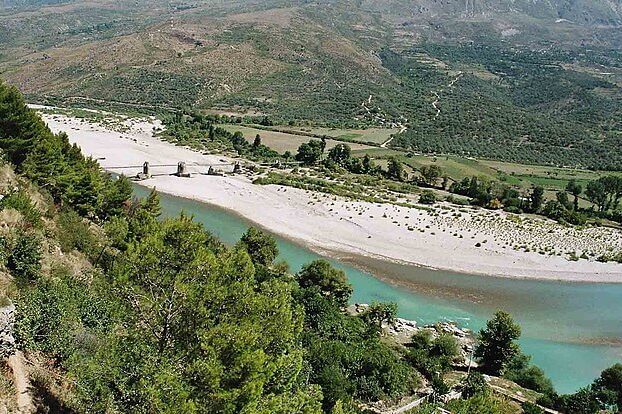
The Albanian government has declared the Vjosa River a national park, the first of its kind in Europe. The river is one of the last free-flowing rivers in Europe, running 168 miles through Greece and Albania to the Adriatic coast. It is home to over 1,000 plant and animal species and is critical to the survival of endangered species like the Balkan lynx and the Egyptian vulture. For a decade, environmental NGOs have fought against the proposed construction of 45 hydropower plants that threatened to destroy the river’s ecosystem. However, a collaboration between the Albanian government, NGOs, and outdoor gear company Patagonia has ensured that the Vjosa River will be protected.
The Vjosa River is one of Europe’s last free-flowing rivers, and its ecosystem is home to over 1,000 animal and plant species. The river starts in the Pindus Mountains in Greece and runs through Albania before emptying into the Adriatic Sea. Its unique ecosystem is rich in aquatic life and supports wildlife like otters, the endangered Egyptian vulture, and the critically endangered Balkan lynx.
For years, the Vjosa River’s ecosystem has been under threat. The construction of hydropower plants, which the government proposed, threatened to destroy the river’s ecosystem. Over the last decade, environmental NGOs have fought to protect the river. Finally, in April 2023, the Albanian government declared the Vjosa River a national park, the first of its kind in Europe.
The Albanian Prime Minister, Edi Rama, made the announcement at a ceremony at Tepelene castle overlooking the river. He stated that the creation of the national park was a “truly historic moment” for nature, social and economic development. “Today we protect once and for all the only wild river in Europe,” he said. “This is about to change a mindset. Protecting an area does not mean that you enshrine it in isolation from the economy.”
The Albanian tourism and environment minister, Mirela Kumbaro Furxhi, said the creation of the park was part of the country’s evolution and continuing emancipation three decades on from communist rule. She said, “Vjosa is a symbol of human history and also a very important part of the history of our country. Maybe Albania does not have the power to change the world, but it can create successful models of protecting biodiversity and natural assets, and we are proud to announce the creation of this first national park on one of the last wild rivers in Europe.”
The Vjosa River national park is a collaboration between the Albanian government, international experts, NGOs from the Save the Blue Heart of Europe campaign to protect Balkan rivers, the International Union for Conservation of Nature (IUCN), and Patagonia. The outdoor clothing company and environmental organization have provided $4.6m to support the national park and protect wild rivers across the Balkans through the non-profit Holdfast Collective, set up in 2022 when Patagonia declared Earth its only shareholder.
The 12,727-hectare park aims to ensure the Vjosa River and its unique ecosystem are safeguarded. It has been given IUCN category II park status, a high level of protection similar to that of a wilderness. The categorization covers “large-scale ecological processes,” species, and ecosystems, crucial to ensuring dams and gravel extraction are banned. It is expected to be operational in 2024.
Unlike the IUCN’s Wilderness Protected Areas, which limit the number of visitors, the Vjosa River national park will allow recreational tourism and some other activities such as local fishing, particularly for 60,000 residents in the catchment.
A 2020 EU study in 28 countries found that Europe has the world’s most obstructed river landscape, with over a million barriers such as dams, weirs, and fords. This fragmentation of rivers negatively impacts their ability to support life.
Ulrich Eichelmann, a conservationist and founder of Riverwatch and part of the Save the Blue Heart of Europe campaign, said: “Most people in central Europe have never ever seen a wild, living river, free from the impacts of human interference, that isn’t diverted or dammed or built up with embankments and where biodiversity is low as a result. But here, you have a wild river, full of complexity and without interference.”
Eichelmann said he hoped it would establish a blueprint for wild rivers elsewhere.
Ryan Gellert, Patagonia’s CEO, said the collaboration proved the power of collective action. “We hope it will inspire others to come together to protect the wild places we have left, in a meaningful way,” he said, adding that the park was proof that the “destruction of nature did not have to be the price of progress”.
Although NGOs acknowledged the progress made in safeguarding the river, they highlighted the need to protect the remaining unprotected parts, including the delta and source in Greece. While an airport is planned at the river delta, Rama promised that it would not pose a risk to nature.
——————————————————————————
At Natural World Fund, we are passionate about stopping the decline in our wildlife.
The declines in our wildlife is shocking and frightening. Without much more support, many of the animals we know and love will continue in their declines towards extinction.
When you help to restore a patch of degraded land through rewilding to forests, meadows, or wetlands, you have a massive impact on the biodiversity at a local level. You give animals a home and food that they otherwise would not have had, and it has a positive snowball effect for the food chain.
We are convinced that this is much better for the UK than growing lots of fast-growing coniferous trees, solely to remove carbon, that don’t actually help our animals to thrive.
This is why we stand for restoring nature in the UK through responsible rewilding. For us, it is the right thing to do. Let’s do what’s right for nature!
Support our work today at https://naturalworldfund.com/ and join in the solution!

